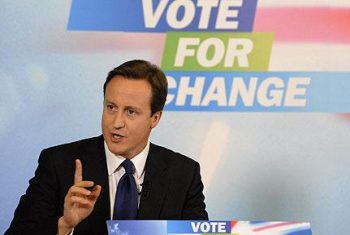
May 9, 2015 • Opinion •
The ballots have been counted and created a surprise by conferring an undisputable victory to the conservative party. In fact two parallel elections took place in Great Britain, one in England the other in Scotland, delivering diametrically opposite messages which will most likely appear incompatible over the medium term.
This unexpected situation may lead the UK, in its negotiations with the EU, to become contaminated by the “democratic” virus of an “imperative mandate” delivered by the elector, already claimed by Syriza in Greece in negotiations with its creditors.
On the one hand the SNP can refer to an imperative mandate in demanding the implementation of the important transfers of powers promised by David Cameron (in agreement with the other English parties) and which allowed him to win the referendum on Scottish independence last September. If the eventuality of a new referendum seems remote before the next Scottish elections, two events could precipitate matters: reneging on the devolution of powers promised to Scotland or a vote in favour of “Brexit” that would be contested by a majority of Scottish voters.
On the other hand, David Cameron is now bound by his pledge to organise an “in/out” referendum on British membership of the EU before the end of 2017. He must therefore initiate “negotiations” to secure changes in the relationship between the UK and the EU. If he has unquestionably been granted an imperative mandate by his electorate it holds no sway over his counterparts. This unbalanced situation could further accentuate the structural and institutional problems that are besetting the EU.
First of all, with whom should David Cameron negotiate? If the media often refer to the Commission as the obvious interlocutor and that President Juncker seems glad to endorse the role, it is, however, difficult to see how such a mandate (on the pattern of the commercial negotiations) – even voted on by the European Council – would be compatible with the competencies the Treaty confers on the Commission. It would seem more appropriate that the “negotiator” be an emanation of the Council, for instance its General Secretariat, or a specifically mandated ad hoc team including the Commission who, as guardian of the Treaty, would verify compatibility.
Next, what can David Cameron negotiate? Clearly no measure that would entail a Treaty change whose complexity, including the ratification process, is totally incompatible with the mandatory timing that the British have set. This self imposed constraint has the following consequence: the more the proposed changes will appear to be merely cosmetic, greater will be the risk that the “Brexit” option will prevail; it should reflect the deep deception – not to say humiliation – resulting from the failure to secure the hoped for concessions, in particular concerning the repatriation of sovereign powers that are at the heart of the debate. Under such circumstances it will be hard for “common sense” arguments (that seem to have gained recently some traction) to prevail over feelings of wounded “national pride”!
The results of the negotiations must imperatively avoid giving the appearance of “concessions” granted exclusively to the UK as the price to pay for keeping it within the Union, even if its membership is highly desirable. One could easily find oneself in the same position of being blackmailed, similarly to that exerted by the Greeks who dangle the (very real) risks to the Eurozone’s survival associated with “Grexit”.
During the negotiations it will be vitally important not to concede any “rights” that could limit the sovereignty of Members by granting, in the name of the single market rules, oversight of measures indispensable to EMU’s further integration. This relates mainly to measures that would “protect” the City of London: its pre-eminence should be safeguarded exclusively through its numerous competitive advantages rather than by measures that would curtail the freedom of its partners to take appropriate decisions to strengthen, for instance, the cohesion of the Eurozone.
Quite to the contrary, it behoves the “European negotiator” to adopt an “offensive” posture aimed at securing advantages for its constituents. The de facto sanctuarisation of the City should be conditioned on the adherence of the UK to EMU, as was initially envisaged by the treaty. Such a posture would have the great merit of clarifying once and for all the debate and preventing – whatever the result – that the UK continues to obstruct the necessary deepening of European integration.
One should absolutely not believe that such a scenario is necessarily hopeless because the stakes have dramatically changed since the Scottish vote. Instead of adopting a “defensive” position, as appears to be the case, the EU should not hesitate to turn the tables on the UK and offer them a clear choice between a “United Kingdom” as a fully fledged member of the EU and an isolated “England”, amputated of a significant part of its territory.
A half baked compromise would only prolong the slow agony of the EU and its inability to bring its full weight to bear on the international scene. Now is the time to transform the English “trap” into an opportunity for a vigorous push towards further European integration.
